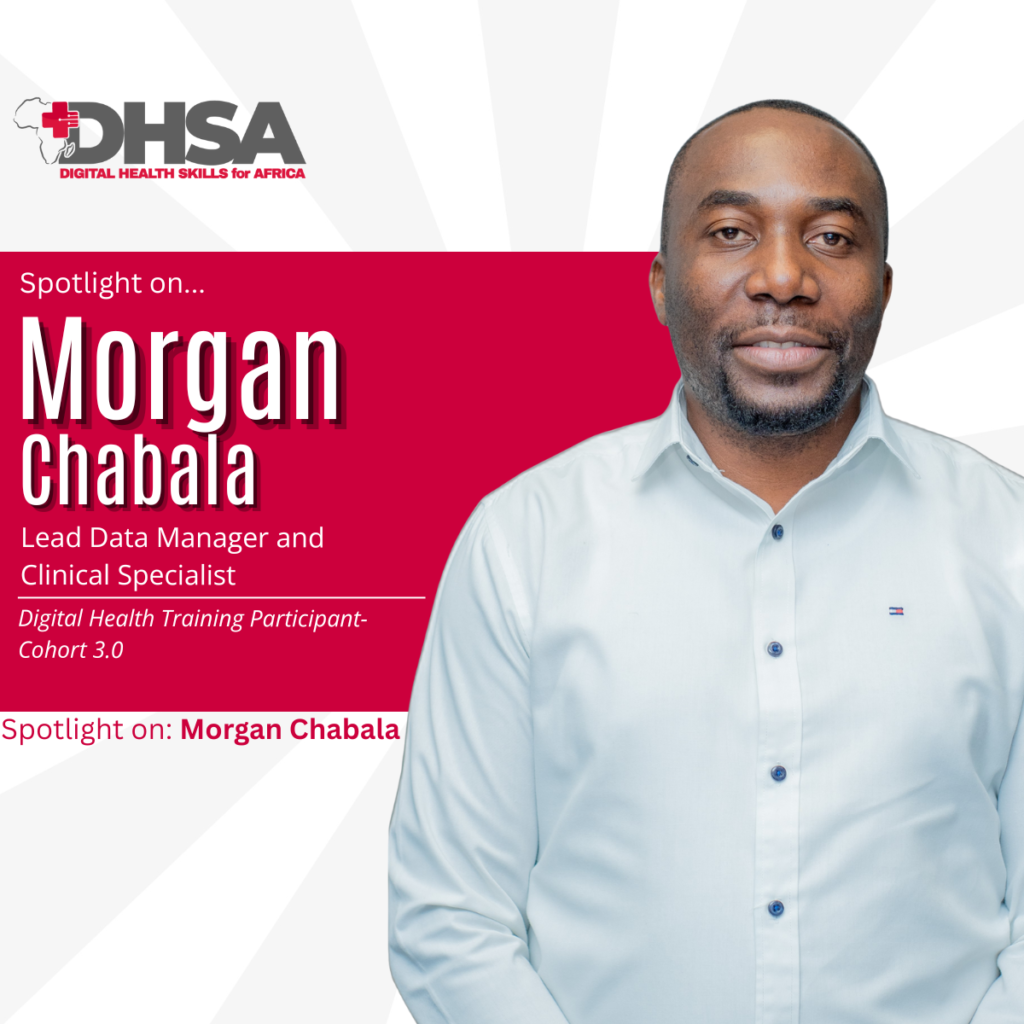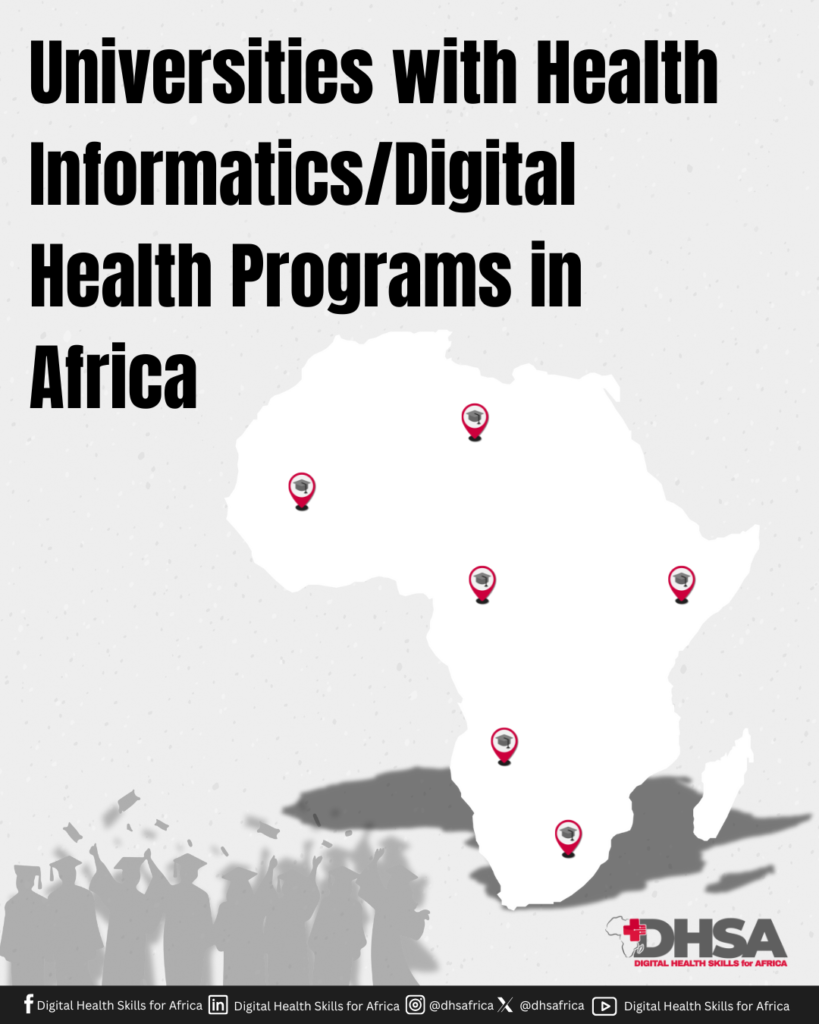
In the rapidly evolving world of digital health, some leaders stand out for their ability to blend innovation with impact. One of them is Morgan Chabala, a seasoned Digital Health and Public Health Specialist with over 12 years of experience shaping donor-funded health programs across Zambia. As a participant in the Digital Health Skills for Africa (DHSA) Training Program, he brings both expertise and vision to the continent’s digital health transformation journey.
Currently serving as Lead Data Manager and Clinical Specialist, Morgan oversees a groundbreaking donor-funded telemedicine initiative in Zambia that has already delivered 36,000+ virtual services to over 16,000 patients since its launch in June 2021, maintaining an impressive 96% adherence rate. His leadership extends beyond implementation, he was instrumental in developing Zambia’s national telemedicine guidelines, integrating digital health into public health systems, and connecting facilities to the Government Wide Area Network (GWAN).
With advanced training in public health and clinical medicine, and now pursuing an MBA, Morgan is also deeply invested in capacity building, having trained more than 120 health workers in digital health solutions. His proficiency in tools such as Power BI, Google Looker Studio, Excel, and Python for data visualization makes him not only a practitioner but also a data-driven innovator.
In this exclusive feature, Morgan Chabala shares insights from his journey, the challenges and opportunities of digital health in Africa, and his vision for the future of technology-enabled healthcare.
- Please tell us a bit about yourself and your background in healthcare or digital health.
I am Morgan Chabala, a clinician and Public Health Specialist with expertise in digital health. I hold a Clinical Medicine Diploma, an MPH and am currently pursuing an MBA. I am passionate about using digital health technologies to bridge healthcare gaps. I have over 12 years of experience managing donor-funded health programs across Zambia. Since 2021, I have served as Data Manager for Morehouse School of Medicine’s national telemedicine program, supporting over 16,000 patients and coordinating more than 35,000 teleconsultations. My work integrates public health, data management, and digital innovation, with a focus on building resilient health systems that improve access, efficiency, and data-driven decision-making.
- What are your perspectives on the state of Digital Health in your country?
Digital health in Zambia holds immense promise but faces challenges such as limited digital literacy, poor internet access, and fragmented systems. The government’s Digital Health Strategy 2022–2026 and the national scale-up of SmartCare EMR reflect strong commitment, yet adoption remains below 20% of
facilities [latest statistics may be higher]. Strengthening interoperability and capacity building are critical to unlocking digital health’s full potential. For example, the 2024 National Budget allocated ZMW 1.2 million ($42,975) to expand SmartCare from 600 to 3,000 facilities by 2027. However, fewer than 20% of clinics currently use it, limiting care continuity. Encouragingly, efforts to connect facilities to the internet via the government-wide area network show strong political will, with the Smart Zambia Institute leading initiatives to bridge health gaps through digital solutions.
- What motivated you to apply for the DHSA Digital Health training Cohort 3.0?
The COVID-19 pandemic and subsequent outbreaks, such as cholera, exposed critical gaps in surveillance and response systems in Zambia. I wanted to gain deeper knowledge and practical skills in digital health frameworks, policy, interoperability, and governance to help address these challenges. The DHSA’s cohort-based model provides a unique opportunity to learn from African peers and leading experts, aligning
with my goal of advancing data-driven policies, empowering frontline workers, and driving digital health transformation in Zambia.
- How has the cohort-based approach (networking, mentorship, and peer learning) shaped your learning experience?
Networking has connected me with diverse professionals across Africa who face similar challenges but apply innovative solutions, broadening my perspective on digital health. Mentorship has provided personalized guidance to navigate real-world issues, while peer learning has fostered collaboration, problem-solving, and knowledge exchange. Together, these have made the experience both enriching and practical.
- Can you share your take on Digital Health capacity building in Africa?
Capacity building and strong political will are essential for sustainable digital health. Countries should integrate digital health into medical training curricula and support broader workforce development. This includes training healthcare workers, data managers, and policymakers to use technology and data effectively. African-led initiatives like DHSA are vital for building local expertise, fostering innovation, and
ensuring contextually relevant solutions. However, government-driven policies and support remain critical for large-scale success.
- Can you share a specific skill or knowledge area you’ve gained from the training that you’ve already started applying in your work?
Response: The training enhanced my skills in data interoperability and Power BI,
which I am applying in building a telemedicine dashboard. This has improved patient
follow-up and integrated care delivery in my projects. Additionally, exposure to digital
health entrepreneurship inspired me to register an organization aimed at optimizing
telemedicine platforms and improving data sharing between systems.
- How do you see digital health shaping your career trajectory, and what are your next steps after completing the training?
Digital health will remain central to my career as I continue to lead innovative, data-driven health programs. After this training, I plan to deepen my expertise through advanced data analytics certifications, complete my ongoing studies in HL7 and FHIR to support interoperability, and engage more actively in policy advocacy for sustainable scale-up. Completing my MBA will further strengthen my ability to drive digital health transformation in Zambia and beyond.
- If you could implement one digital health solution in your community or workplace today, what would it be and why?
I would implement a telemedicine platform connecting rural communities to specialized care, addressing Zambia’s high patient-to-doctor ratio. This solution would reduce geographic barriers, improve timely diagnosis and treatment, and include a mentorship component for knowledge exchange with remote clinicians. Additionally, integrating remote patient monitoring tools for NCDs would further strengthen continuity of care in underserved areas.
- What advice would you give to healthcare professionals and/or students considering a career in digital health?
Be curious, adaptable, and committed to continuous learning. Digital health
is fast-evolving and interdisciplinary, requiring both technical skills and a patient-
centered mindset. Embrace it, evolve with it, or risk being left behind. Seek mentorship
and engage in peer networks to stay updated and collaborate effectively.
- Could you describe the DHSA Digital Health training in three words?
Response: Inspiring, Practical, Empowering


